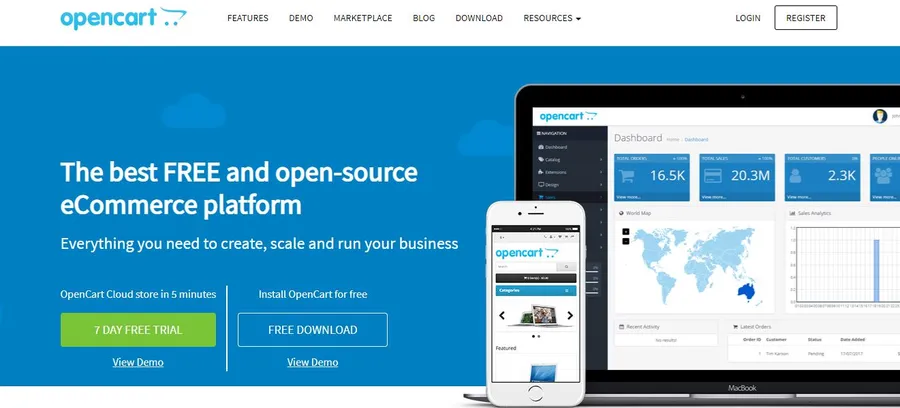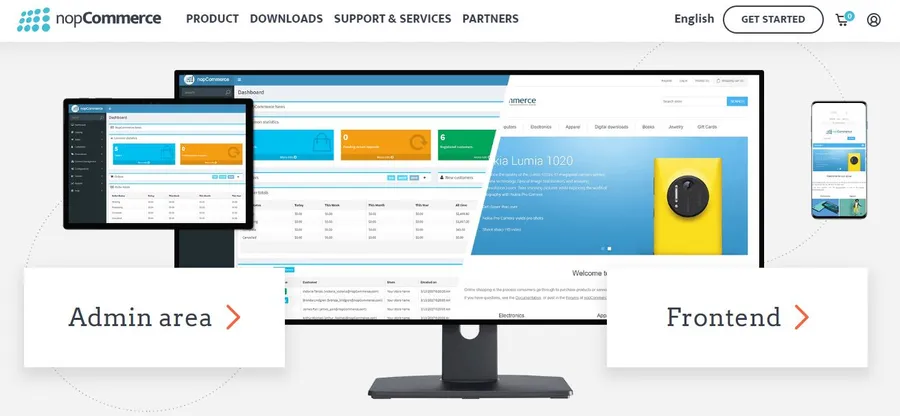Dive Into The World’s Best Open Source eCommerce Platforms
If you’re looking for a budget-friendly and adaptable way to create your online store, consider using an open source eCommerce platform.
These platforms provide free, customizable code for building and managing your online store, offering more flexibility and control over your website.
Additionally, you can join a community of developers and users for assistance in enhancing your store.
With numerous open source eCommerce platforms available, selecting the best one for your needs can be daunting.
However, you can relax; we have compiled a list of some of the top ones for you with their main features so you can choose the most appropriate platform for your requirements.
Let’s get started!
What Is An Open Source eCommerce Platform?
An open source eCommerce platform is a software application that allows businesses to sell products and services online. It is freely available for anyone to use, modify, and distribute.
Open source eCommerce platforms are typically written in a programming language such as PHP, Python, or Ruby on Rails.
They consist of a core codebase that provides the basic functionality of an online store, such as product management, shopping carts, checkout, payment processing, and order management.
This core codebase can be extended and customized using many plugins, themes, and other extensions.
What To Look For When Choosing An Open Source eCommerce Platform

Choosing the right open source eCommerce platform for your business is a critical decision that can impact your online success.
Several factors need to be considered, including your specific needs and requirements, budget, technical expertise, and growth potential.
Key considerations for choosing an open source eCommerce platform:
- Ease of use: Assess the platform’s user-friendliness and ease of setup to ensure it aligns with your technical capabilities.
- Features: Evaluate whether the platform offers the essential features you need to manage your online store effectively.
- Customizability: Determine the platform’s flexibility to adapt to your unique business requirements and branding preferences.
- Security: Prioritize platforms with robust security measures to protect your customer data and financial transactions.
- Support: Consider the availability of community support and resources to assist you in troubleshooting issues and enhancing your store.
- Scalability: Choose a platform that can seamlessly scale to accommodate your business’s growth as your customer base expands.
- Community: Assess the size and activity of the platform’s community for knowledge sharing, plugin development, and general assistance.
- Hosting: Decide whether you prefer a self-hosted or hosted solution based on your technical expertise and resource availability.
- Development: Evaluate the availability of developers and agencies familiar with the platform to assist with customization and integration needs.
- Cost: Consider the total cost of ownership, including any licensing fees, hosting expenses, and potential customization costs.
Benefits of Using Open Source eCommerce Platforms

When using an open source eCommerce software, you will get several benefits for your business, such as:
- Cost-effectiveness: No licensing fees
- Flexibility: Highly customizable
- Scalability: Accommodating growth
- Community Support: Valuable resources
- Security: Constantly reviewed code
- Control: Over website and data
- Transparency: Code is available for inspection
- Innovation: Continuous development
- Developer-Friendly: Easy to integrate and develop custom solutions
- Long-term Viability: Supported by the community
How To Get Started With An Open Source eCommerce Platform
Creating an online store using an open source eCommerce platform is a straightforward process.
Here’s a simple guide to get you started:
- Define your goals and requirements.
- Choose the right one from several open source eCommerce platforms.
- Select a reliable hosting provider.
- Install and configure the platform.
- Add products and manage inventory.
- Design and customize your store.
- Integrate essential tools.
- Test and optimize your store.
- Launch and promote your store.
- Monitor and maintain your store.
WooCommerce – Best Open Source eCommerce Platform

WooCommerce is a WordPress plugin that turns your WordPress website into an online store. It is the best open source eCommerce platform that comes to everybody’s mind at first sight.
WooCommerce is a popular choice for small and medium-sized businesses because it is easy to use, affordable, and has a large community of developers.
Main features:
- Easy to use and set up
- Affordable
- Large community of developers
- Support many extensions
- Flexible and customizable
Magento Open Source – Open Source eCommerce Platforms

Magento is one of the open source eCommerce platforms that is known for its scalability and flexibility.
It is perfect for businesses that need a powerful eCommerce platform that can be customized to their specific needs. If you have heard about Shopify, you can check out Magento vs Shopify to know what the differences are.
Main features:
- Free and open-source
- Scalable and flexible
- Powerful features for managing products, customers, and orders
- A large community of developers and users
- Requires more technical expertise than WooCommerce
Joomla

Joomla is a free CMS platform that can be used to create eCommerce websites. Joomla is not as popular as WooCommerce or Magento, but it is a solid solution for businesses that are looking for a free and easy-to-use eCommerce platform.
Main features:
- Open source eCommerce
- Easy to use and customize
- Flexible and scalable
- SEO-friendly
- Secure
- A large community of developers and users
OpenCart

OpenCart is one of the most user-friendly and lightweight open source eCommerce platforms, known for its intuitive interface and ease of customization.
It’s a popular choice for small to medium-sized businesses that want a straightforward and cost-effective solution.
Main features:
- User-friendly interface and easy installation
- Lightweight and fast performance
- Multi-store and multi-vendor support
- Extensive range of extensions and themes
PrestaShop

PrestaShop comes with a robust feature set, providing a comprehensive solution for managing an eCommerce business. This open source eCommerce software supports multi-store management, inventory control, marketing tools, and customer relationship management (CRM) capabilities.
PrestaShop’s flexibility extends to payment gateways and shipping options, allowing businesses to cater to a global audience.
Main features:
- Mobile-optimized storefront
- Extensive customization options
- Multi-store and multi-vendor support
- Strong internationalization and localization capabilities
- Active community of contributors and developers
Drupal Commerce

Drupal Commerce is among the best open source eCommerce platforms built on the Drupal CMS framework. It’s highly customizable and integrates seamlessly with Drupal’s powerful content management capabilities.
Main features:
- Built on the robust Drupal CMS
- Highly customizable and extensible
- Integrates with Drupal’s content management features
- Strong community support
nopCommerce

nopCommerce is a scalable and customizable open-source eCommerce platform known for its enterprise-level features and ASP.NET technology. It’s considered the best open source eCommerce platform that you should try.
Main features:
- Enterprise-level features and scalability
- Multi-store and multi-vendor support
- ASP.NET technology for high performance
- Strong focus on security and reliability
Don’t forget to check out Claue from ArrowTheme! Claue is a beautiful and responsive Magento theme that will make your store look great on all devices, including smartphones and tablets.
Read More: 8+ Top Free Magento Templates For Your eCommerce Sites



